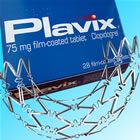
|
(Note: A newer version of this article appears here, updated as of October 4, 2012) The financial cost of Plavix has been a problem for many stent patients who are prescribed this expensive brand-name antiplatelet drug. The new generic Plavix (clopidogrel) can be purchased for a fraction of the price. Read on to learn more, including a price comparison that shows you where to shop, a look at the role of online patient communities, breaking news about Plavix co-pay discounts, and more resources to help you get the most affordable antiplatelet drugs. Generic Plavix Hits the Market: Why it Matters for Patients
Plavix (clopidogrel) is prescribed for a year or more after placement of a heart stent in order to prevent the stent from clotting up and causing a heart attack. Called "stent thrombosis", this complication, although very infrequent, is fatal more than a third of the time. In 2010, worldwide sales of Plavix topped $6 billion (yes...billion!). For a typical stent patient, one 75mg tablet of brand-name Plavix a day cost more than $210 a month. Those with drug-eluting stents (80% or more of patients) generally must take Plavix for a year minimum. So, until now, the required medication often cost more than the stent itself. Generic Plavix Price Comparison: Cost Per Pill As of May 2012, prices are all over the map (1). The hope has been that generic Plavix will generally drop to $1 a pill. But as of May 29, 2012 both CVS and Walgreens were offering generic Plavix at around $6 a pill, only pennies less than they charged for brand-name Plavix just a few weeks ago (it seems that the price for brand-name Plavix has risen since it went generic). WalMart/Sam's Club is offering generic clopidogrel in their in-store pharmacies for approximately $1.46 per pill. But the price winner, as of late May 2012, is the major online / brick and mortar pharmacy Costco. Their cash price averages $0.35 a pill, or only $10 a month! Online Patient Communities: Sharing Antiplatelet Deals New Plavix Co-Pay Discounts: Competing with Generic Antiplatelet Drugs Here's a link to get the Plavix Co-Pay Discount Card.
Not All Stent Patients Benefit from Plavix/Clopidogrel: Should You Be on Effient or Brilinta Instead? There is some concern that an unintended effect from the reduction in price for Plavix/clopidogrel could be that insurance companies will balk at paying for these other brand-name antiplatelet medications in patients who do not do well on Plavix. Hopefully this problem won't occur, because heart patients who do not respond to Plavix should have equally affordable lifesaving medications available to them. You can read more about patients who do not respond to clopidogrel and how they can be tested and treated in Angioplasty.Org's interview with Dr. Eric Topol.
Reported by Deborah Shaw, Patient Education Editor, May 30, 2012 |
